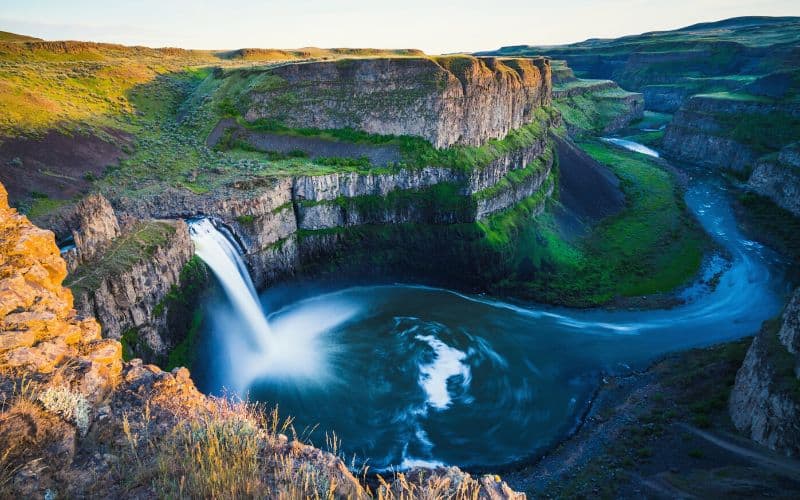From the snowy peaks of the North Cascades to the green rolling hills of Palouse, some of the country’s most stunning natural landscapes are located in Washington State.
And what better way to immerse yourself in the great outdoors than on a camping trip?
Dispersed camping in the Evergreen State is the perfect way for anyone wanting to disconnect from the hustle and bustle of everyday life and experience the beauty of the Pacific Northwest.
In this guide, we’re exploring some of the best free camping in the Evergreen State, including must-know wild camping rules and essential information about each campsite.
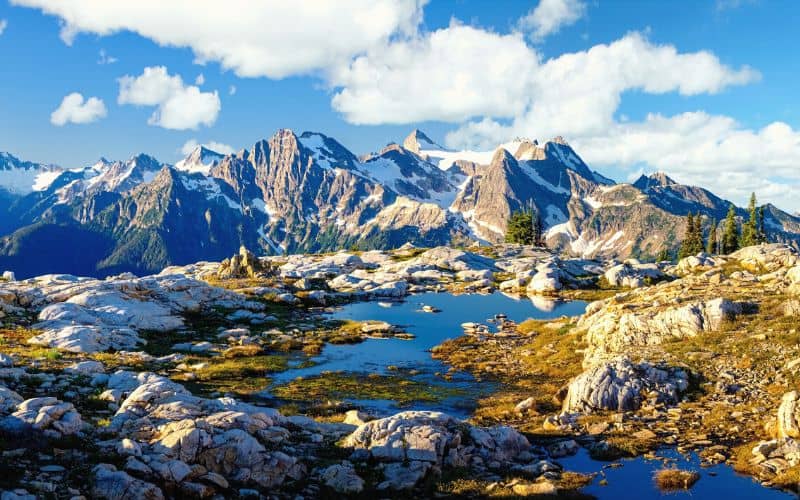
Table of Contents
- Is Dispersed Camping Legal in Washington?
- Washington Dispersed Camping Rules
- Our 11 Favorite Dispersed Camping Areas in the Evergreen State
- 1. Forest Road 29, Olympic National Forest
- 2. Sullivan Creek Dispersed Campsites, Colville National Forest
- 3. Forest Service Road 23, Gifford Pinchot National Forest
- 4. Caliche Lake
- 5. Mountain Loop Highway, Snoqualmie National Forest
- 6. Tinkham Road, Snoqualmie National Forest
- 7. Barker Canyon, Banks Lake
- 8. Trout Lake Campground
- 9. Forest Road 52, Mount Rainier
- 10. Sherry Creek Campground
- 11. Lower Sandy Dispersed Sites, Baker Lake
- Best Dispersed Camping in Washington!
Is Dispersed Camping Legal in Washington?
Yes, dispersed camping is legal in Washington State, but only in designated regions like national forests and other public lands. There is no dispersed camping allowed in or near developed recreation areas like trailheads and established campgrounds.
The Evergreen State allows wild camping in specific areas within land managed by four government agencies. The federal and state agencies that permit dispersed campsites are the Bureau of Land Management (BLM), the US Forest Service Dispersed Camping (USFS), the Washington Department of Natural Resources (WADNR), and the US Army Corps of Engineers (USACE).
Although dispersed camping is generally allowed, it’s important to contact the regional offices for the area you plan to visit before driving out and pitching a tent. The office can help you find a free dispersed campsite in the designated area, inform you of the current regulations (like fire bans), and send you a useful map of the region.
BLM manages the largest amount of land for dispersed camping in WA. Most of this land is found in the eastern part of the state, near Spokane and the Columbia Basin.
The US Forest Service manages thousands of acres of wooded land for dispersed camping within seven national forests, including Olympic National Forest.
While not entirely free, the Washington Department of Natural Resources offers a budget-friendly Discover Pass. This annual pass grants you access to 80 DNR campgrounds throughout the Evergreen State. It’s a fantastic value if you take a lot of camping trips in the area.
Unbeknownst to many, the United States Army Corps of Engineers administers land around the Columbia River valley where dispersed camping is also permitted. Since most of these sites are loathed in the parking lots next to the boat ramps, these are not the wildest sites around, but they do have access to vault toilets.
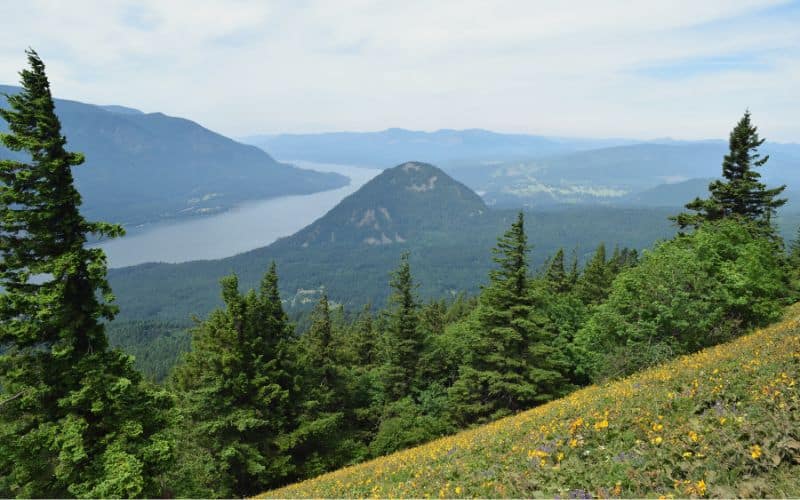
Washington Dispersed Camping Rules
Heading out deep into the wilderness to sleep under the stars surrounded by nothing but nature is an incredible experience. This is why many campers prefer dispersed camping over staying at developed campgrounds.
Following regulations for wild camping is key when visiting these beautiful backcountry zones to help preserve our natural resources.
The dispersed camping rules in Washington State vary depending on which government agency manages the land. Contact the administrative agency for the area you’re camping in to learn about that specific area’s regulations.
While regulations vary by location, here are some general guidelines from the US Forest Service and BLM:
- Free dispersed camping is usually allowed on BLM land for up to 14 days within a 28-consecutive-day period, but limitation rules vary per office.
- Always use an existing campsite or choose an area without vegetation to avoid damaging the sensitive ecosystem.
- Keep campsites and cars at least 200 feet from rivers, streams, lakes, and wetlands.
- Pack out all trash and leave the campsite cleaner than you found it.
- Respect other campers and wildlife by keeping noise levels to a minimum.
- Always use a biodegradable soap for washing and stay 200 feet away from natural water sources.
- Dig catholes six to eight inches deep and at least 200 feet from any water source. Pack out used toilet paper to prevent animals from digging it up.
- Always contact the local agency before your trip to check current restrictions.
- Abide by local fire restrictions, use existing fire rings, and keep fires small.
- Never leave a campfire unattended and always put out a fire with water before going to sleep.
- Respect the wildlife by observing from a distance and storing your food securely to avoid attracting animals.
In addition to the rules provided by the local management agency, it’s important for dispersed campers to always practice Leave No Trace Principles when staying in the wilderness to reduce their impact on the environment.
Our 11 Favorite Dispersed Camping Areas in the Evergreen State
1. Forest Road 29, Olympic National Forest
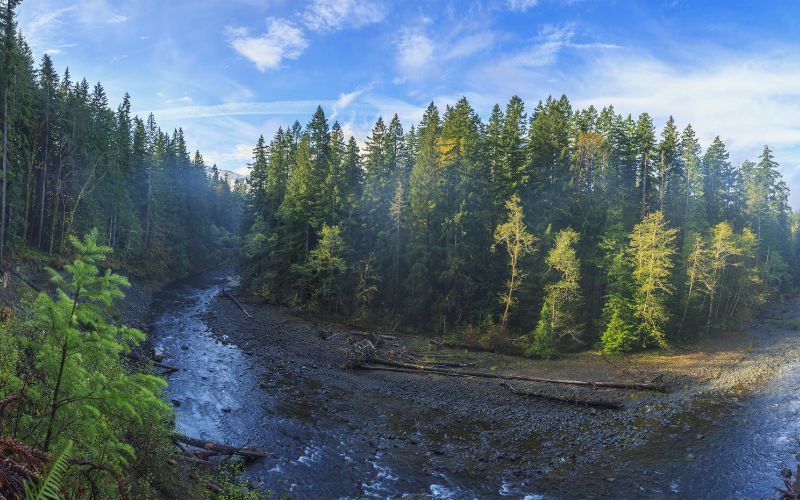
Forest Service Road 29 is a great dispersed camping area in the northwest corner of Olympic National Forest. There are many other free camping locations scattered throughout the Olympic Peninsula, but this is one of the best around.
Although it’s a somewhat busy area, there’s room for everybody! There are numerous spacious campsites located just off FS Road 29. Several of these are even large enough for camper vans, truck campers, fifth wheels, and RVs. If you can’t find an opening, just keep driving along the road and you’ll eventually reach a spot for tent camping.
The northern section of the road is better equipped for larger RVs because part of it is paved. The middle section is where the road narrows and begins ascending a mountain. This section is best left for those with four-wheel drive vehicles. South Forest Road 29 has a mix of medium and large campsites and is easy to drive for the first few miles.
Campfires are allowed below 3,500 feet in this district when not prohibited by current fire restrictions. Keep in mind that you can only collect wood from the surrounding area if it’s already dead and down.
To enjoy one of our favorite mellow Washington hikes nearby, take the Olympic Discovery Trail, which meanders along the shores of the Sol Duc River. Otherwise, head to Olympic National Park for something a little stiffer!
2. Sullivan Creek Dispersed Campsites, Colville National Forest
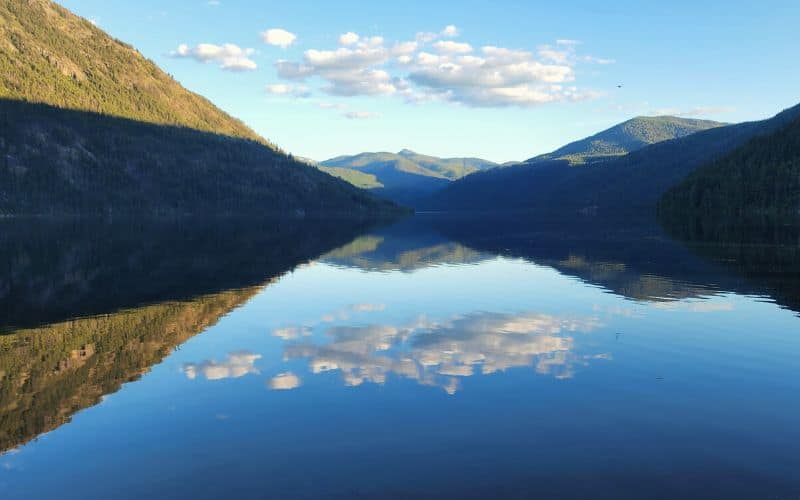
The Sullivan Creek Dispersed Campsites are a series of designated places to pitch a tent in Colville National Forest. This 1.5 million-acre national forest is located in northeast Washington State.
The nice thing about these semi-developed yet private campsites is that they come with a few amenities that you normally wouldn’t get at a regular dispersed site. Sullivan Creek features food lockers, fire pits, picnic tables, vault toilets, and graveled parking surfaces at multiple sites.
Offering all of these nice amenities for free makes this a popular spot! Arrive as early as possible to score a good site, especially on summer weekends.
The campsites are positioned along Sullivan Creek Road and split up into small clusters near the toilets at Moon Flats, Conto Gulch, and John’s Creek. The sites fit vehicles and RVs up to 25 feet in length.
This dispersed campground is closed in the winter and open seasonally from May 15 to November 15.
Nearby outdoor activities include plenty of excellent hiking trails, boating on Sullivan Lake, and fishing in the creek.
3. Forest Service Road 23, Gifford Pinchot National Forest
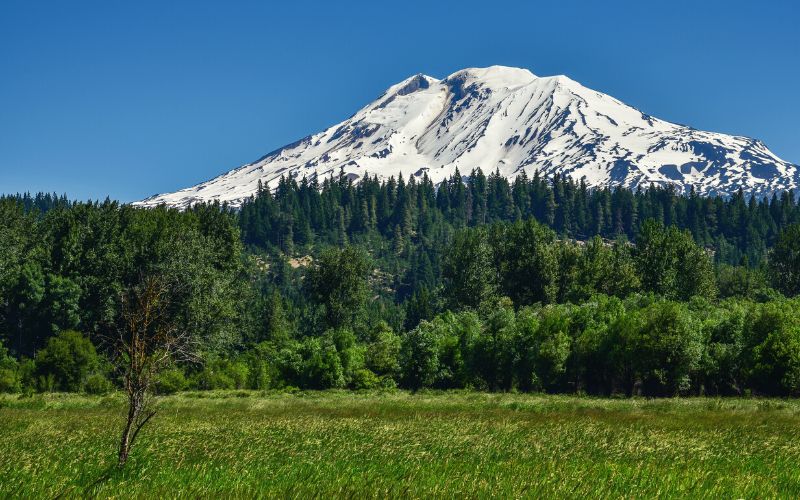
Gifford Pinchot National Forest encompasses over 1.3 million acres of protected land and is considered to be one of Washington’s top forested areas. This spectacular national forest is home to pristine wildlife habitats, flowing creeks, ancient glaciers, epic mountains, and Mount St. Helens National Volcanic Monument.
Located on the eastern side of Gifford Pinchot National Forest, the Forest Service Road 23 camping area is situated on the side of Mt Adams. The road runs from Trout Lake north to Randle and crosses over Babyshoe Pass through the high Cascades.
On your way towards Babyshoe Pass, you’ll pass by a handful of established campgrounds at Council Lake. You’ll see road pull-offs for dispersed campsites along the southern side of the pass.
Expect to see other campers along this well-known stretch of road for free camping. Its proximity to incredible backpacking trails, like Williams Mine Trail, and quick access to Mt. Adams makes it a moderately-visited spot.
Forest Road 23 is closed in the winter when it’s covered in ice and snow. The road and camping areas are open from early summer through fall.
4. Caliche Lake
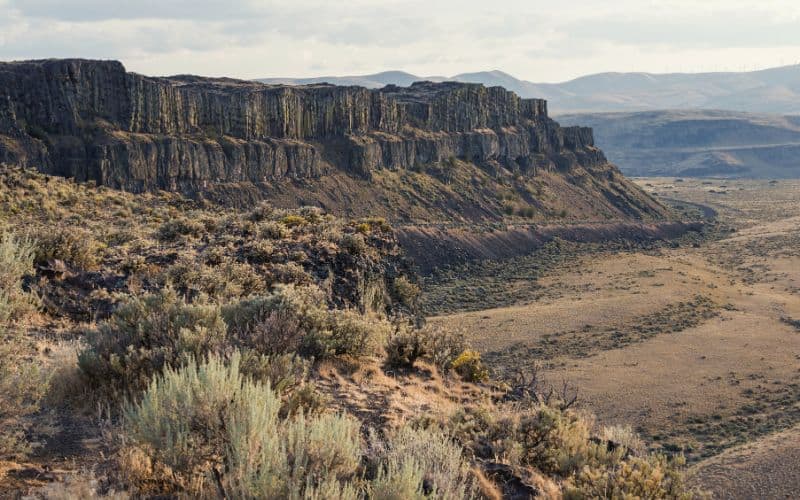
Caliche Lake offers wild campsites just a few miles from the Columbia River in central Washington State. While it doesn’t offer the forested scenery most other spots have, you just can’t beat this area’s easy accessibility and proximity to services. It’s directly off Interstate 90 and less than five miles from the town of George.
Fishing enthusiasts flock to this zone for excellent trout fishing in Upper Caliche Lake, especially in the early spring. While rock climbers prefer this spot because it’s less than two miles from the world-class climbing available at Frenchman Coulee.
The campsites are spacious and can fit everything from tents to recreational vehicles. Other than being free, one of the advantages to staying here is that you can drive to town at any time to restock on ice and groceries.
5. Mountain Loop Highway, Snoqualmie National Forest
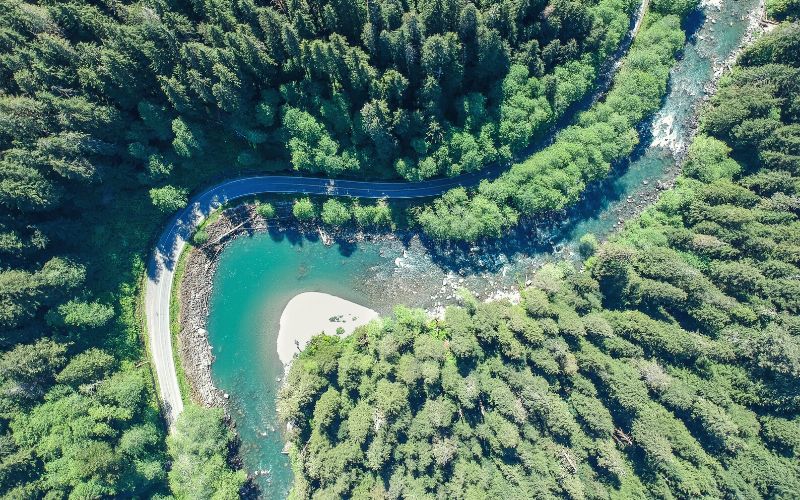
The Mt. Baker-Snoqualmie National Forest is situated on the western edge of the Cascade Mountains in between the border with Canada and Mt. Rainier National Park. High-elevation meadows, old-growth forests, and snow-covered peaks abound in this magnificent region of the Evergreen State.
For one of the top places to pitch a tent for free, head to the winding Mountain Loop Highway, also known as the Mountain Loop Scenic Byway. This winding mountain road links Darrington with Granite Falls.
The majority of the sites here are basic pull-offs from the road, but some of them are nestled deep in the forest. A few of the spots are situated along the South Fork Sauk River and provide a prime location for access to the river where you can fill up on water.
6. Tinkham Road, Snoqualmie National Forest
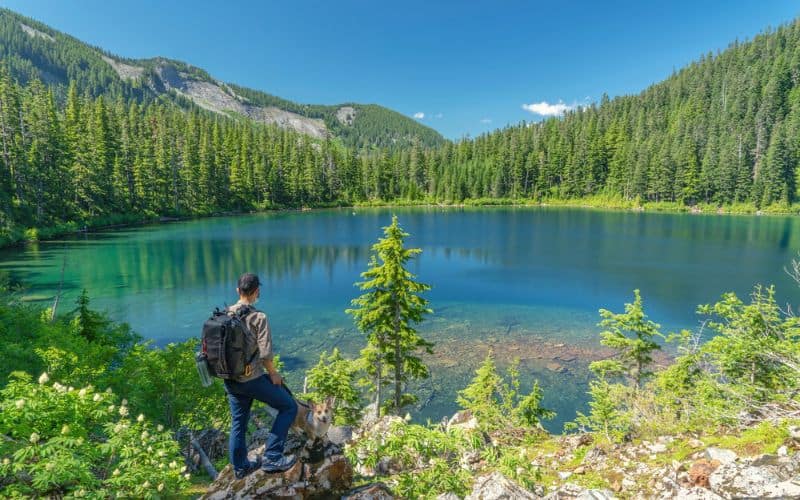
Also located in Mt. Baker-Snoqualmie National Forest, Tinkham Road hosts some of the closest dispersed camping sites to Seattle – and, thus, access to some of the top hikes near Seattle.
Its proximity to a major city and free price tag has led to it becoming crowded, especially during the summer. Be sure to arrive early to secure a site. If you show up and there’s nothing available, you can get a paid site at the developed campground along Tinkham Road. There are additional dispersed campsites east of the road and north of Lake Cle Elum.
The campsites here provide a good amount of privacy, but some of the easiest-to-access pull-offs are now closed. Larger rigs should consider staying elsewhere due to the road’s infamous potholes. Those without high-clearance vehicles will need to drive slowly.
Hikers will enjoy exploring the popular trail to Annette Lake at the end of Tinkham Road. And those seeking to relax can unwind with the sounds of the rushing river nearby.
7. Barker Canyon, Banks Lake
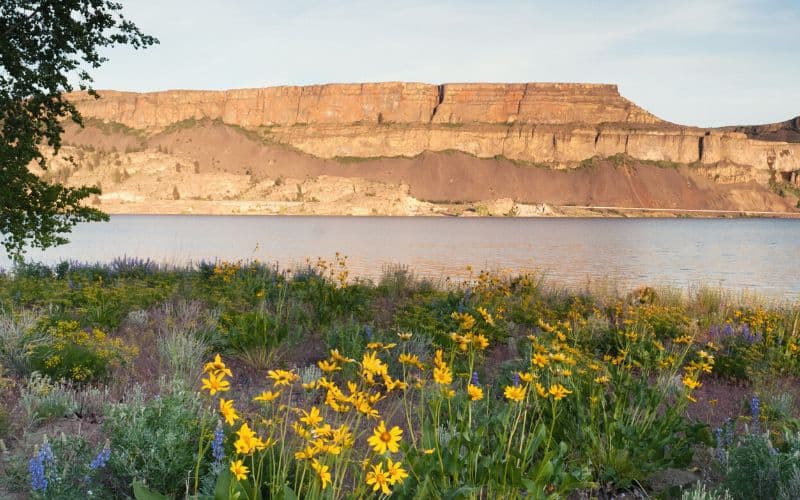
Barker Canyon offers beautiful waterfront dispersed sites along the shores of Banks Lake. This wilderness region in northeastern Washington State offers a tranquil getaway for those looking to get away from it all, even in the summers.
Campers can pitch a tent or park an RV around the boat launch on the northwest side of the lake. There are no other facilities except for the pit toilet at the boat launch.
This area is less than eight miles from the town of Grand Coulee, making it easy to drive over to restock on supplies if needed.
Steamboat Rock State Park is located just across the lake. Here you’ll find an established campground and a few hiking trails.
8. Trout Lake Campground
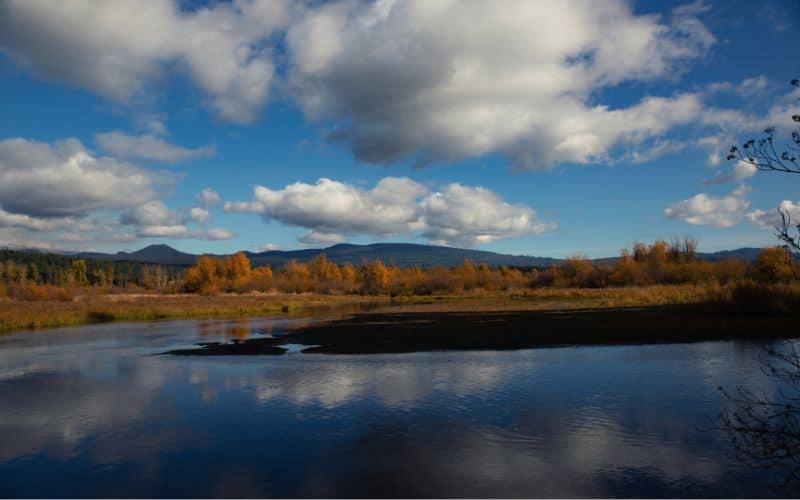
Trout Lake Campground is a small yet stunning campground in northeast Washington. It’s nestled amongst the trees near Kettle Falls in Colville National Forest.
The campground features a handful of tent sites near the lake with access to a fishing dock. A few of the sites can also accommodate small campers The lake is only open to noncombustible motors, so there’s no noise pollution from boats to disturb the quiet environment.
The 4.7-mile-long Hoodoo Canyon Trail begins right at the campground and connects with the Emerald Lake trail. Opportunities for wildlife viewing here include moose and whitetail deer.
In addition to these sites, nearby Trout Lake Road also has dispersed campsites.
9. Forest Road 52, Mount Rainier
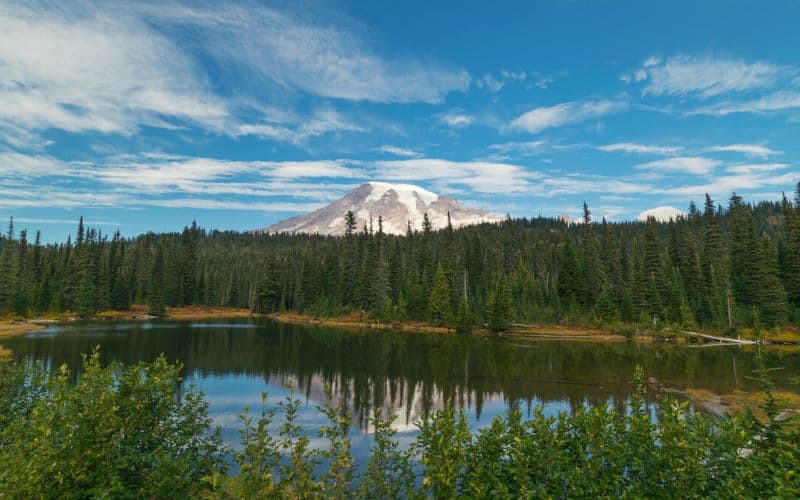
Located a few miles southwest of Mount Rainier National Park, Forest Road 52, also known as Skate Creek Road, is home to some of the most scenic dispersed camping areas in the Evergreen State.
The road winds along the beautiful Skate Creek as it stretches from Packwood to Elbe. Be aware that this road is paved, but it is not well maintained.
Forest Road 52 traverses a low-elevation forest with evergreen and deciduous trees and features breathtaking views of Mount Rainier. There are several free campgrounds/campsites located along the length of the road.
This is one of the premier free campsites for day visitors to Mount Rainier National Park.
10. Sherry Creek Campground
While not exactly free, Sherry Creek Campground is one of our top choices for cheap camping in the Evergreen State. You must purchase an annual Discover Pass to stay at this campground. The pass provides great value since it includes entry to a total of 80 DNR campgrounds across the state.
Located in the Little Oreille Forest, this campground provides easy access to Little Pend Oreille Lakes, Sherry Creek, and the 78-mile Little Pend Oreille Trail System for ORV riders. It’s a mid-elevation campground surrounded by a lush conifer forest. The campsites here are located off an easy-to-navigate gravel road and can accommodate RVs up to 35 feet long.
Unlike many others on this list, these campsites feature a picnic table and fire pit at each site. The campground also offers access to drinking water and vault toilets.
11. Lower Sandy Dispersed Sites, Baker Lake
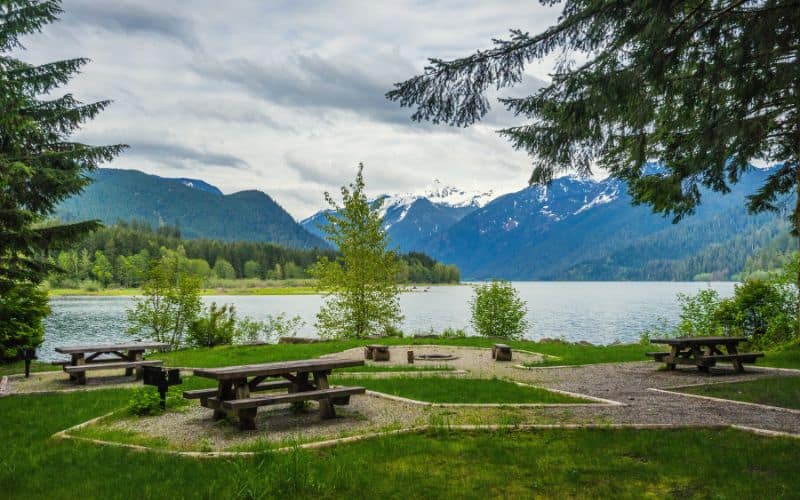
Baker Lake is a stunning 4,800-acre reservoir featuring the jaw-dropping peaks of Mount Baker as a backdrop. It’s a gorgeous area with plenty of opportunities for outdoor adventures such as camping, boating, fishing, picnicking, and hiking.
The nearby Baker Lake Trail is a family-friendly hike that hugs the lake’s eastern shoreline before crossing Baker River at the north end.
The Lower Sandy Dispersed Sites offer a few small campsites perched right on the western shore of the lake.
Best Dispersed Camping in Washington!
There’s nothing quite like getting away from it all and spending a few nights under the stars at dispersed campsites. We hope this guide to the top free dispersed campsites helps you find the perfect place to pitch a tent in the Evergreen State.
What are your favorite dispersed camping spots in Washington? Feel free to share them in the comments below. If you enjoyed this article, please send it to your friends!
